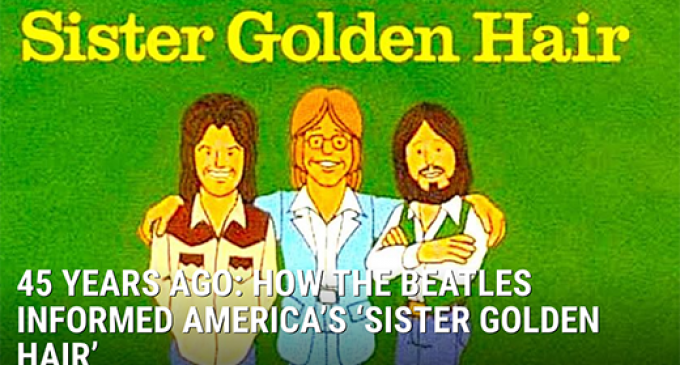How the Beatles Informed America’s ‘Sister Golden Hair’

It’s perhaps no surprise that America‘s “Sister Golden Hair” shares a Beatlesque guitar line, considering the presence of producer George Martin. But the connection actually runs deeper.
“I very openly tip my hat there to ‘My Sweet Lord,'” composer Gerry Beckley told Songfacts in 2016. “I was such a fan of all the Beatles, but we knew George [Harrison] quite well and I just thought that was such a wonderful intro.”
Martin brought a suitably deft production style to “Sister Golden Hair,” which was released to radio on March 19, 1975. Elsewhere, a number of his artful touches bolster Hearts, the second in a run of albums with America that expanded their elemental style. Martin also brought engineer Geoff Emerick, a key figure in the Beatles’ late-period studio renaissance.
“To give you the deepest version of your answer, [Emerick] revolutionized multi-track recording,” Beckley told Songfacts. “When he first started, you weren’t allowed to close-mic drums. He used to have to go into Abbey Road and quietly kick the mics closer to the drums while the technicians weren’t looking because he would have been in trouble. You know, you had to have a guy in a lab coat move the mics. So Geoff Emerick, people might not know his name, but he rewrote the whole book.”
“Sister Golden Hair” solidified a comeback begun with their initial collaborations together on 1974’s Holiday, which spawned a pair of Top 5 singles. That marked America’s first trip to the upper echelons in a couple of years, ending a period where they had started to overthink things and try too hard.
Beckley was producing their albums with bandmates Dewey Bunnell and Dan Peek back then, “and we realized we were spending a lot of money,” Bunnell told Vinyl Dialogues in 2018. “By the time we got to the third album, we said, ‘This is too much work. We need a producer.'”
Manager David Geffen arranged for Martin to meet with America. “We were these young whippersnappers and George was coming out of the Beatles thing — it had been a few years since they had broken up — and he was basically available,” Bunnell added.
He gave America something they’d sorely lacked on 1973’s Hat Trick. “The word I use is ‘focus,'” Beckley told the Post-Bulletin in 2015. “We had started to expand and try different things. George brought back the focus.”
Listen to America’s ‘Sister Golden Hair’
Sessions for this second collaboration began with pulling “Sister Golden Hair” off the trash heap. Beckley demoed the song before recording 1974’s Holiday, but it somehow didn’t make the final track listing.
“So ‘Sister’ sat for over a year, until the next album,” Beckley told Greg Prato in 2015. “I can’t really tell you if it was a lack of faith in the song or not, but it was interesting to see. It shows you that songs can have a life of their own: They might just need the right time and circumstances to surface.”
“Sister Golden Hair” memorably opened with one of the most heartbreaking lines in pop-music history: “Well, I tried to make it Sunday, but I got so damn depressed that I set my sights on Monday, and I got myself undressed.” Beckley says he drew lyrical inspiration from Jackson Browne, who’d just released 1974’s despondently introspective Late for the Sky.
Browne “has a knack, an ability to put words to music, that is much more like the L.A. approach to just genuine observation as opposed to simplifying it down to its bare essentials,” Beckley told John Corbett in 1998. “I find Jackson can depress me a little bit, but only through his honesty.”
At the same time, “Sister Golden Hair” continued a streak of stubborn obliqueness dating back to America’s career-making debut single, 1972’s “A Horse With No Name.”
“I’d like to point out that you can have a No. 1 record with a line that enters that darkly,” Beckley told Songfacts. “That’s kind of my thing: I try to mix these emotions and I think ‘Sister’ was a great example. Pretty good message in there. John Lennon famously said, ‘We don’t know what these songs are about ’til people tell us.’ So, all of our songs, including ‘Horse,’ are open to interpretation. But ‘Sister’ was a relationship song, and there is a variety of elements. We always combine them as songwriters – so that they’re not verbatim, word for word, for a particular circumstance. Poetic license, we call it.”
“Sister Golden Hair” also became a confirmation of Martin’s legend, returning the producer to the top of the charts for the first time without the Beatles. His impact on America was just as lasting.
“He loved the adventure of making music, and consequently made each project unforgettable,” Beckley told Rolling Stone in 2016. “He was a mentor who guided the process of recording the songs we brought to the studio with a sensitive creative touch, always aware of the fragility of the ideas we were trying to express in a song. We are forever grateful for his guidance during that time in our career.”
Read More: How the Beatles Informed America’s ‘Sister Golden Hair’ | https://ultimateclassicrock.com/america-sister-golden-hair/?utm_source=tsmclip&utm_medium=referral
Source: How the Beatles Informed America’s ‘Sister Golden Hair’




There are no comments at the moment, do you want to add one?
Write a comment